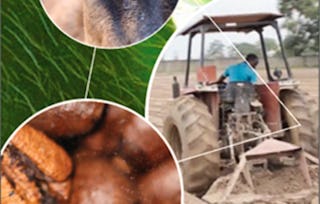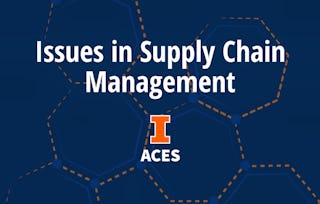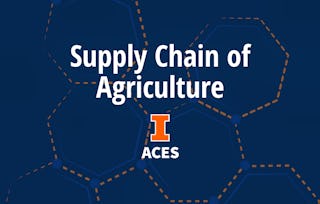Throughout this course, you will delve into the intricate details of the food production system through a system-thinking lens. You will examine the grand challenges faced by the food, fiber, and natural resource industries, and their repercussions on people, the planet, and profit. By the end of this course, you will have a clear understanding of the concept of systems thinking, be able to explain the three key pillars of sustainability and link these pillars to social, environmental, and economic systems.

Sustainable Food Systems
6 days left! Gain next-level skills with Coursera Plus for $199 (regularly $399). Save now.

(37 reviews)
Recommended experience
What you'll learn
Explore the pillars of sustainability in food production and examine grand challenges in food, nutrition, economics, environment, & energy systems.
Skills you'll gain
Details to know

Add to your LinkedIn profile
9 assignments
See how employees at top companies are mastering in-demand skills

There are 8 modules in this course
In this module, learners will explore the complexities of the food system, examine the ways systems thinking influences our world, and examine some of the grand challenges and emerging issues in the food, economic, environmental, and energy systems.
What's included
7 videos6 readings1 assignment
In this module, learners will investigate the three pillars of sustainability and their relationship to the food system, explore major challenges and emerging issues, and examine the ultimate goal of derisking the future.
What's included
7 videos2 readings1 assignment
In this module, learners will define and explore the types of food production systems, examine the production and processing systems in the food systems, and investigate the roles of consumers and producers.
What's included
7 videos2 readings1 assignment
In this module, learners will investigate issues related to world hunger, access to nutritious food, food deserts. Learners will also explore the emotional and cultural connections to food.
What's included
5 videos4 readings1 assignment
In this module, learners will explore environmental grand challenges and investigate issues related to water and soil quality.
What's included
3 videos2 readings1 assignment
In this module, learners will examine issues in land access and food production demands, explore potential uses of non-productive land, and investigate the influence of a consumer-driven economy.
What's included
4 videos3 readings1 assignment
In this module, learners will explore grand challenges in energy and technology within the food system, examine the roles of switchgrass and carbon in our environment, and investigate issues in energy and technology.
What's included
4 videos2 readings1 assignment
In this module, learners will examine the complexities of and decisions associated with food, food production systems, and sustainability. Learners will explore specific ways he/she/they can contribute toward solutions for grand challenges in sustainability and sustainable food systems.
What's included
5 videos2 readings2 assignments
Instructor

Offered by
Explore more from Environmental Science and Sustainability
 Status: Free Trial
Status: Free TrialUniversity of Illinois Urbana-Champaign
 Status: Preview
Status: PreviewUniversity of Copenhagen
 Status: Free Trial
Status: Free TrialUniversity of Illinois Urbana-Champaign
 Status: Free Trial
Status: Free TrialUniversity of Illinois Urbana-Champaign
Why people choose Coursera for their career

Felipe M.

Jennifer J.

Larry W.

Chaitanya A.
Learner reviews
37 reviews
- 5 stars
62.16%
- 4 stars
24.32%
- 3 stars
10.81%
- 2 stars
0%
- 1 star
2.70%
Showing 3 of 37
Reviewed on Nov 12, 2024
A very mind transforming course indeed. It is an addition to me as a graduate of Agricultural Extension
Reviewed on Sep 18, 2024
This course is really helpful to understand food systems in present times especially with context to sustainable energy, renewable energy, perennials, landscape diversity, circular economy etc
Frequently asked questions
To access the course materials, assignments and to earn a Certificate, you will need to purchase the Certificate experience when you enroll in a course. You can try a Free Trial instead, or apply for Financial Aid. The course may offer 'Full Course, No Certificate' instead. This option lets you see all course materials, submit required assessments, and get a final grade. This also means that you will not be able to purchase a Certificate experience.
When you purchase a Certificate you get access to all course materials, including graded assignments. Upon completing the course, your electronic Certificate will be added to your Accomplishments page - from there, you can print your Certificate or add it to your LinkedIn profile.
Yes. In select learning programs, you can apply for financial aid or a scholarship if you can’t afford the enrollment fee. If fin aid or scholarship is available for your learning program selection, you’ll find a link to apply on the description page.
More questions
Financial aid available,





